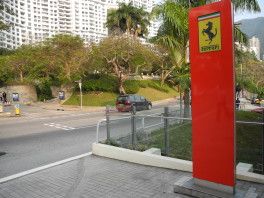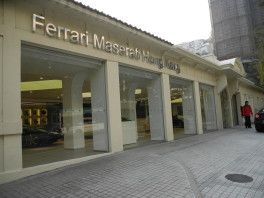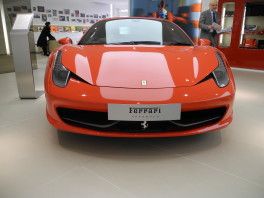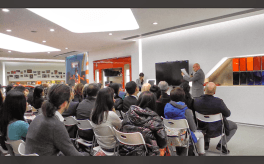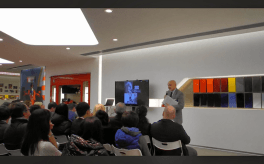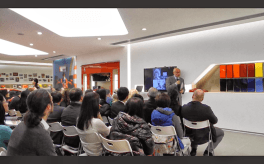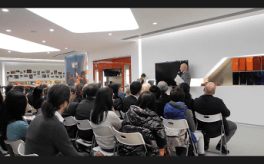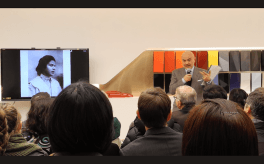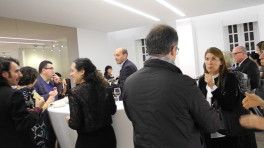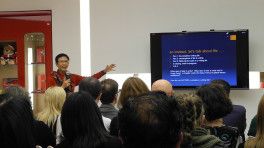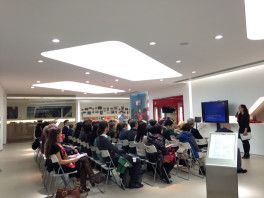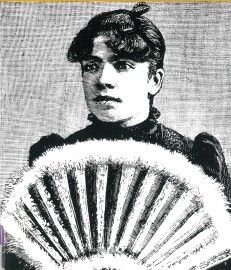 Auto-Italia Hong Kong offered a splendid venue to the Dante Alighieri Society of Hong Kong which created a futuristic contrast, mixing modernity, speed, beauty and tradition, aptly represented by the books of Grazia Deledda.
Auto-Italia Hong Kong offered a splendid venue to the Dante Alighieri Society of Hong Kong which created a futuristic contrast, mixing modernity, speed, beauty and tradition, aptly represented by the books of Grazia Deledda.
Atsuko, Tracy, Elisa of Dante Alighieri worked hard to make sure that everything was properly organized, down to the smallest details, offering their usual expertise, making sure that all worked like clock-work.
About 70 spectators travelled from Central and Kowloon putting aside their working engagements. The nuorese Ciriaco Offeddu had been the motor behind this event and will be for those which will follow.
Grazia Deledda was born in 1871 in Nuoro, Sardiania, where she spent the first part of her life, then 36 years in Rome and in Cervia (her summer retreat). She died in 1936. She had only elementary school education, since her family barred her to go to high school and university (as her brothers did) but she built her writing skill by reading, writing and taking a sort of private tuition given by a teacher. The society in which she was born was still very backward looking like most the Italian province, but this just make her achievements more remarkable.
Ciriaco Offeddu when a child met old people in Nuoro who still remembered Grazia Deledda (some of those people are visible in Youtube). Their remembrance of Grazia Deledda was somehow shaded by a slight bias due to the fact that most of the characters she had portrayed had really existed. Just imagine Edgar Lee Masters the author of The Spoon River Anthology going back to his folks and to his village!
The name of Grazia Deledda is tied to Sardegna Island, and there is a reason for that, as most of her books speak of her native land. Deledda wrote every day, two to three hours in the afternoon, seven days a week, and always by hand. She did not use a typewriters which were already available, like some other authors, like some contemporary authors, like Jeffrey Archer to quote one.
Deledda’s father died when she was only 16 and she lost her elder sister when she was 25 by abortion.
Deledda dreamt, since she was a small child, to move to Rome and live there, finally realizing her goal and meeting her husband (who was coming from Lombardy) and moving straight away to the newly created capital of the kingdom of Italy.
And here is how Giuseppe Prezzolini, in a 100 pages condensed story of Italian literature define her:
There is truth in her characters, sometimes too folkloristic but heroic, passionate, simple, silent which made her dear to Scandinavians. She deserves to be read even today for the fabulous level of her prose.
Part of the money she received she donated to poor writers anonymously, like Sibilla Aleramo and Dino Campana. Three months after the Nobel she checked in a hospital to have her left breast removed, that disease will kill her in 7 years time. She refused all requests to give talks.
She did not follow the fashions of her times (she was not even a feminist in the suffragette sense but she joined the Women Congress of 1909 and 1923, Turkish stamps) but she delved on the classics, like Victor Hugo, Puskin and Tolstoj. Dostojevsky, Gogol, Balzac.
Like D’Annunzio was put on a world stage by the choice of a right translator, Georges Herelle who masterfully translated her works in French.
FORTHCOMING EVENTS
-In March there will be a show with a silent movie with Eleonora Duse, inspired by her book Cenere. Perhaps this could be staged at the Macau arts festival.
-In May there will be the staging of a theatrical piece written by our friend Juan Morales taken from some of her most successful books and we will try to get an expert from Italy that could give a lecture on her. Then the play by Juan will be translated in Italian and presented in Nuoro, Italy.
-In October there will be a delegation of professors and students from City University to Nuoro, for a writing retreat, Ciriaco and Hong Kong writer Xuxi will travel there.


